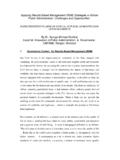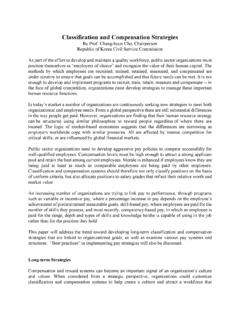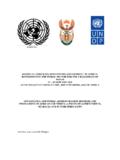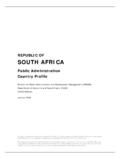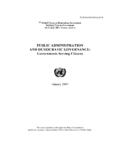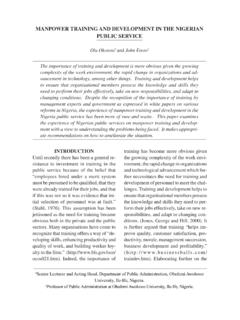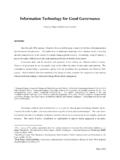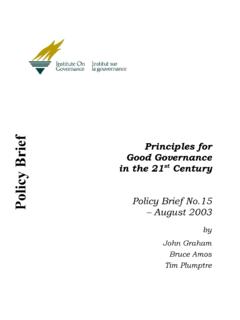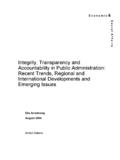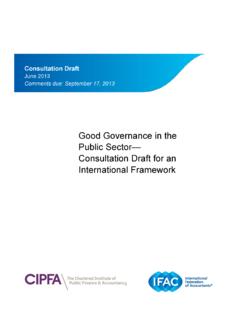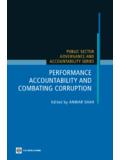Transcription of Concept Paper: Transparency and Accountability in Public ...
1 RAB/01/006: Transparency and Accountability in the Public sector in the Arab Region Concept paper 3 integrity , Transparency and Accountability in Public sector Human Resources management March 2004 _____ UN DESA DPADM would like to acknowledge the author of this paper , Professor. Ahmed Sakr Ashour (Alexandria University, Egypt). The views expressed therein are entirely those of the authors and do not necessarily reflect the views of the United Nations 2 Introduction 1 Over the last decade, a vast amount of academic as well as policy-support research has been conducted on integrity , Transparency and Accountability and conversely corruption in the Public sector .
2 The issue of ethical conduct of Public employees received a great deal of focus from international, regional and national organizations, interested in promoting the performance of the Public sector . A consensus has developed world-wide over the importance of reforming Public sector institutions to strengthen integrity , Transparency and Accountability and to prevent and combat corruption. Such reforms are crucial to protecting Public resources, enhancing Public sector performance, and strengthening the government s role in orchestrating development and providing basic services. A serious challenge faces developing countries in accelerating development and growth.
3 With the advent of globalization, they face many obstacles to having a greater share of world trade and investment. Overcoming such obstacles requires major reforms in the Public sector to enhance its efficiency and effectiveness. It also requires better governance that is more inclusive of the various groups in society. Moreover, the success and effectiveness of Public sector reforms rest on more effective control over corruption. Within this context, managing various resources of the government and the Public sector needs to be revitalized and transformed to correspond and provide support to overall reforms.
4 At the core of the transformation is human resources management (HRM), since the human factor is key to the various practices and roles of the government. Thus, this paper examines the integrity , Transparency and Accountability in HRM, which are critical ingredients for improving government performance, in general, and combating administrative corruption, in particular. HRM Institutional Framework integrity and corruption refer to the opposing degrees to which human conduct meet certain legal and moral standards within the context of institutions. The likelihood of either kind of conduct is primarily determined by institutional factors, embedded in the design of Public sector institutions.
5 Policies, regulations, conditions, common practices, incentives/penalties as well as the prevailing norms and institutional culture constitute the most important factors influencing the tendencies towards either ethical or corrupt behaviour. Increasing integrity or ethical conduct and reducing corrupt or unethical behavior have to start in the diagnosis and reform of the institutional environment in which Public sector employees work. The theme of the present paper is how to trace these behavioral tendencies back to the institutional conditions, constituting the HRM system: policies and practices.
6 (Few among the many publications which tackled the subject of integrity and corruption focus on how Public sector HRM reforms could substantially contribute to enhancing integrity and combating corruption. The few that tackled the subject focused on the institutional role of HRM in 1 The author of this paper greatly benefited from comments and suggestions made by Ms. Elia Armstrong and other unanimous reviews at the UN DPADM on an earlier version of the paper . RAB/01/006- Transparency and Accountability in the Public sector in the Arab Region- integrity , Transparency and Accountability in Public sector Human Resources management 3promoting professionalism and ethics in Public service.)
7 Most of the other writings focused on Public financial and, procurement systems.) The present paper analyzes the anatomy of corruption and malpractices in HRM. It offers an institutional framework that results in more ethical, or more corrupt behavior, within Public sector organizations. It analyzes HRM policies and regulations that make up or impact upon the framework. The paper then reviews international trends and implications for needed reforms in Public sector HRM in the Arab region. Corruption and Malpractices in Public sector HRM The following analysis delineates various types and examples representing critical incidents of corruption and malpractices by the various functional areas of Public sector HMR.
8 The analysis focuses on the institutional deficiencies in the HRM system that give rise to these malpractices. Deficiencies in the Overall Institutional Framework Failing to state and enforce basic ethical/ integrity principles in the overall HRM strategy and policies leaves HRM void of ethical/ integrity direction; Failing to outline and enforce limits on political and personal influences, thus safeguarding Transparency , allows such influences to penetrate into HRM decisions; The absence of clearly stated and enforced policies to promote professionalism in HRM allows the whole system to be vulnerable to malpractices and corruption.
9 And A lack of a code of ethics, guiding and enforcing the standards of HRM units and employees can lead to a lack of Accountability . The implications of the above deficiencies are clear. A lack of direction for integrity in the overall HRM strategy and policy, and the resulting weakened state of professionalism, would be reflected in the various HRM functions ( planning, recruitment, selection, compensation, etc). The most serious ramification is on the caliber and competence of the people working for the Public sector , including the officers managing the HRM system itself. Under the above conditions, deteriorated efficiency, lowered performance, a lack of fairness, and the spread of corruption and spoils-sharing among HRM staff and Public sector employees risk becoming common.
10 HR Planning An absence of an HR plan for each Public sector organization, based on a sound procedure of needs assessment and analysis, linked to workload and performance requirements; An absence of systematic data on job classification, personnel, vacancies, etc covering various job groups, units, levels and employment conditions ( contractual arrangement, RAB/01/006- Transparency and Accountability in the Public sector in the Arab Region- integrity , Transparency and Accountability in Public sector Human Resources management 4part-time, etc.) in each Public sector organization; basic HR information is a prerequisite for wage control and for safeguarding against corruption and malpractices in Public employment; A lack of an overall HR policy emphasizing merit and competence; in the absence of these criteria, the likelihood of basing staffing decisions on subjective and non-meritorious considerations is high; and The absence of a policy for diversity (in various levels and job areas), resulting in disproportionate representation or exclusion.
